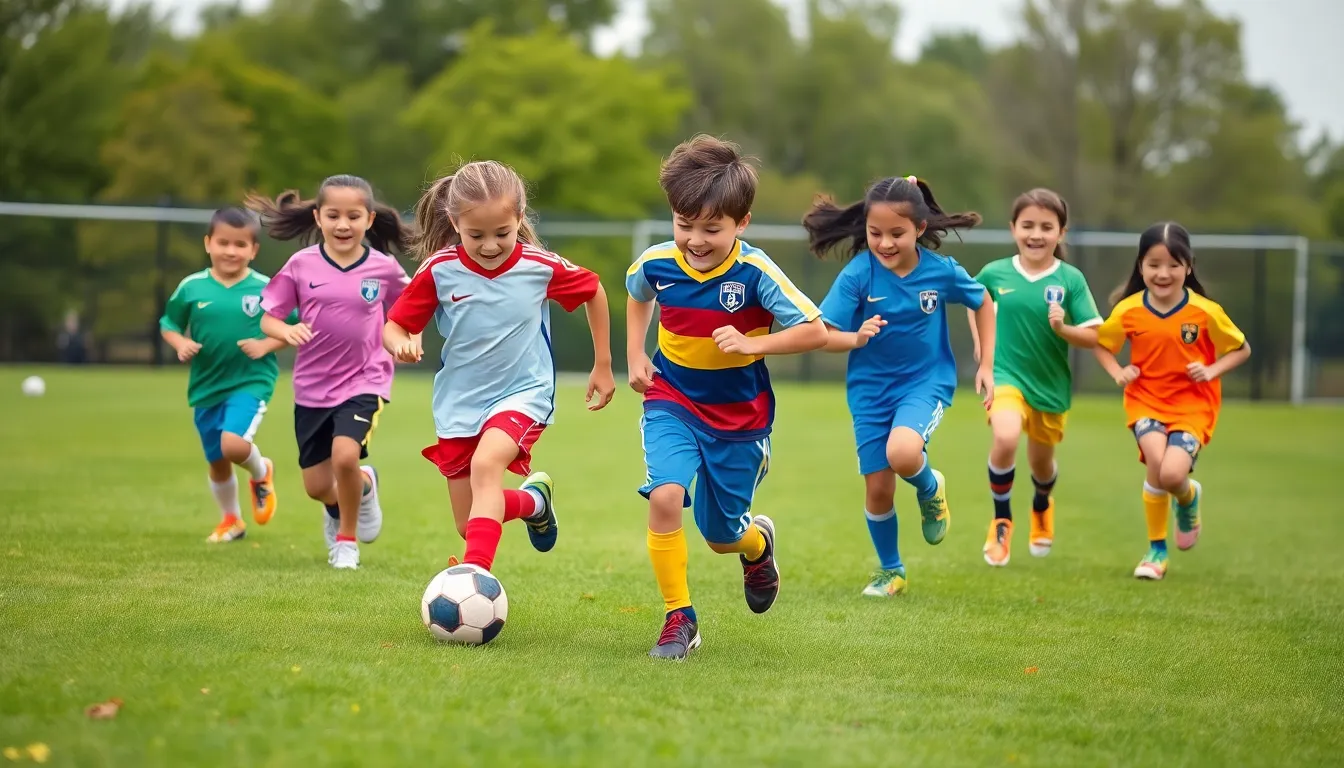Finding the right sport for kids can feel like searching for a needle in a haystack, especially when they’re busy bouncing off the walls. With so many options out there, it’s easy to get overwhelmed. But fear not! The world of sports is a treasure trove of fun, fitness, and friendship just waiting to be explored.
Table of Contents
ToggleOverview Of Kids Sports
Selecting a sport for kids involves understanding their interests and physical abilities. Kids experience a variety of benefits from participating in sports, including improved fitness, social skills, and confidence. Team sports like soccer, basketball, and baseball encourage teamwork and communication. Individual sports such as swimming, gymnastics, and tennis allow for personal growth and self-discipline.
Different age groups often enjoy specific sports. For example, younger children may benefit from fundamental skill development in sports like T-ball or flag football. As kids grow older, they may pursue more competitive options, such as wrestling or track and field. Each sport offers unique challenges and learning opportunities.
Safety remains a crucial factor when deciding on sports for kids. The American Academy of Pediatrics provides guidelines on age-appropriate activities and safety measures to prevent injuries. Parents can further enhance safety by ensuring kids wear proper equipment.
Moreover, it’s essential to encourage kids to try multiple sports. Exploration promotes well-rounded athletic skills and helps kids discover their passions. Participation in various sports fosters adaptability and resilience, qualities beneficial in all areas of life.
Organized leagues or recreational teams often provide structured environments for kids. Coaches usually focus on skill development while also emphasizing sportsmanship. Parents benefit from observing their children in a team atmosphere, offering valuable bonding experiences.
Exploring options in kids sports can lead to lifelong interests and friendships. The right sport can inspire enthusiasm for physical activity that extends beyond childhood.
Popular Team Sports

Many children enjoy participating in team sports, which offer a fun way to learn important skills such as cooperation and communication. Here are some popular options.
Soccer
Soccer ranks as one of the most played sports worldwide for kids. Players develop skills like coordination and agility while learning to work together. Games encourage sportsmanship and respect for opponents. Soccer leagues often cater to various age groups, ensuring that children experience appropriate competition levels. Furthermore, the simple equipment requirements make soccer accessible. Programs typically focus on fostering a love of the game, promoting fitness through active play.
Basketball
Basketball is another exciting sport that emphasizes teamwork and strategy. Kids learn to dribble, shoot, and pass while enjoying energetic games. Success on the court requires strong communication skills, as players must collaborate effectively with teammates. Many schools and community centers offer leagues for different age groups, which support skill development. Joining a basketball team can also boost a child’s confidence, as they engage in healthy competition and make new friends.
Baseball
Baseball provides a classic team sport experience, promoting skills such as hand-eye coordination and strategic thinking. Children learn to bat, catch, and run the bases while connecting with teammates. Little League programs focus on fun and fair play, ensuring that kids enjoy their time on the field. The sport’s seasonal nature also allows kids to balance it with other activities throughout the year. Participation in baseball helps instill a sense of commitment and encourages a strong work ethic among young athletes.
Individual Sports
Individual sports offer children opportunities to develop personal skills and foster self-discipline. These activities encourage independence while providing essential fitness benefits.
Tennis
Tennis benefits children by improving hand-eye coordination and agility. Players must demonstrate quick reflexes as they respond to fast-moving balls. This sport enhances focus and strategic thinking, pushing kids to anticipate their opponent’s moves. Additionally, tennis can be played both recreationally and competitively, providing options suitable for various skill levels. Organized clubs often offer lessons, ensuring kids learn proper techniques and sportsmanship in a structured environment.
Swimming
Swimming provides a full-body workout and promotes cardiovascular health. Mastery of stroke techniques enhances endurance and boosts confidence. Water safety skills are crucial, making swimming an important life skill. Many kids enjoy the social aspect, training with friends in teams or classes. Various swimming styles, including freestyle and breaststroke, help children develop their unique strengths. Local swim teams encourage participation in competitions, fostering a sense of achievement as they progress.
Gymnastics
Gymnastics develops flexibility, strength, and coordination. Kids learn to perform routines that challenge their balance and body awareness. Classes often emphasize discipline and focus, crucial for mastering complex moves. Participation also builds confidence, as children see their progress through achievements in skills and competitions. Various disciplines, including artistic and rhythmic gymnastics, allow children to explore diverse talents. With structured training sessions, gyms create supportive environments that encourage teamwork and personal growth.
Benefits Of Sports For Kids
Participating in sports offers numerous advantages for children, impacting both physical and social development.
Physical Health
Engaging in sports enhances physical health by promoting cardiovascular fitness, muscular strength, and flexibility. Regular activity reduces the risk of childhood obesity, a growing concern among today’s youth. Structured playtime aids in the development of motor skills such as coordination and balance. Many sports, including soccer and swimming, provide opportunities for aerobic exercise, essential for overall health. Additionally, sports instill healthy habits early, encouraging lifelong fitness and wellness. The American Academy of Pediatrics supports these benefits, emphasizing the importance of physical activity for growing bodies.
Social Skills
Sports participation also fosters social skills through teamwork and communication. Kids learn collaboration while working together toward a common goal, which builds friendships and enhances interpersonal skills. Sports environments often promote inclusivity, allowing children to interact with diverse peer groups. Conflict resolution becomes a crucial skill, as children navigate competitive situations and learn to handle wins and losses gracefully. Engaging in team activities encourages the development of leadership qualities and boosts self-esteem, ultimately transforming shy kids into confident individuals. These social interactions create lasting connections, making sports an invaluable experience for youth.
Tips For Choosing The Right Sport
Selecting the right sport for a child requires careful consideration of various factors. Understanding age considerations and individual interests plays a crucial role in this process.
Age Considerations
Age plays a significant role in determining the appropriate sport for a child. Younger children often benefit from activities that emphasize fundamental skills like balance and coordination. Programs like T-ball and beginner soccer classes offer excellent starting points. Older children might seek more competitive environments, engaging in sports that require advanced technical skills. Team sports often nurture social interaction for younger participants, while individual sports can empower older kids to pursue personal goals. Considering maturity levels ensures a suitable match between a child’s abilities and the demands of the sport.
Interests And Preferences
A child’s interests heavily influence their enjoyment and engagement in sports. Observing what activities excite a child helps identify potential sports to explore. Encouraging kids to express their preferences fosters a sense of ownership in their sports journey. This exploration can include trying various sports, from team-based options like basketball to individual pursuits like tennis. Prioritizing a child’s enjoyment leads to positive experiences and builds lasting passion. Creating opportunities for kids to participate in sample classes provides insight into their preferences, ensuring a better fit when choosing the right sport.
Choosing the right sport for kids can open doors to a world of fun and development. By understanding their interests and abilities parents can guide children toward activities that resonate with them. Whether it’s the camaraderie of team sports or the personal growth found in individual pursuits each option offers unique benefits.
Encouraging kids to explore various sports not only helps them discover their passions but also builds essential life skills. As they engage in physical activity they develop friendships and learn valuable lessons about teamwork resilience and discipline.
Ultimately the right sport can lay the foundation for a healthy active lifestyle that extends well into adulthood.









